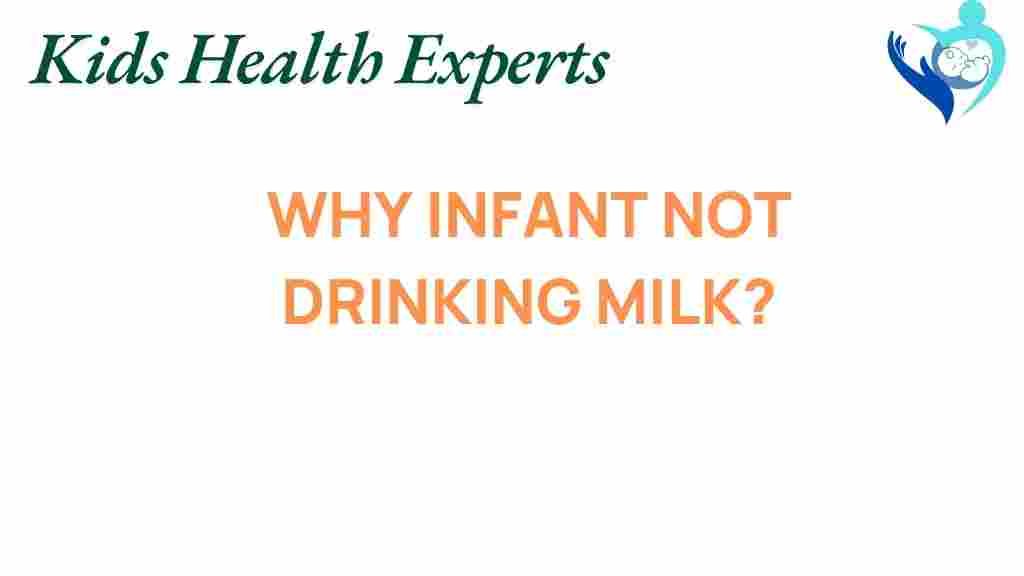Why Is Your Infant Refusing Milk? Understanding Infant Nutrition and Milk Refusal
As a parent, few things can be as concerning as noticing your infant refusing milk. Milk is a fundamental component of infant nutrition, providing essential nutrients necessary for growth and development. When your little one suddenly turns away from their bottle or breast, it can lead to a whirlwind of parental concerns. In this article, we will unravel the mystery behind milk refusal, explore common feeding issues, and provide expert pediatric advice to help you navigate this challenging phase.
Understanding Infant Nutrition
Infant nutrition is critical in the first year of life. During this period, babies grow rapidly, and their dietary needs are unique. Breast milk or formula is designed to meet these needs, offering a perfect balance of carbohydrates, proteins, fats, vitamins, and minerals. Understanding the fundamentals of infant nutrition can help you address issues related to milk refusal effectively.
Common Reasons for Milk Refusal
Milk refusal can stem from various factors, and recognizing these reasons is the first step in addressing them. Here are some common causes:
- Growth Spurts: During periods of rapid growth, infants may have fluctuating appetites.
- Teething: Teething can cause discomfort, making sucking painful.
- Illness: A cold, ear infection, or other health issues may lead to temporary milk refusal.
- Dietary Habits: Introduction of solids or changes in feeding routines can disrupt established patterns.
- Parental Anxiety: Stress or anxiety in the household can affect an infant’s feeding behavior.
Step-by-Step Process to Address Milk Refusal
If your infant is refusing milk, don’t panic. Here’s a step-by-step approach to understanding and addressing the issue:
Step 1: Observe Patterns
Keep a journal of your infant’s feeding habits. Note when they refuse milk, how often it happens, and any accompanying symptoms (like fussiness or illness). This can help identify potential triggers.
Step 2: Check for Signs of Illness
Monitor your baby for signs of illness. If they exhibit symptoms such as fever, vomiting, or diarrhea, consult your pediatrician promptly. Health issues can significantly affect an infant’s appetite.
Step 3: Evaluate Feeding Environment
Ensure that the feeding environment is calm and comfortable. Distractions or a stressful atmosphere can discourage an infant from feeding. Consider the following:
- Reduce noise and distractions.
- Hold your infant in a comfortable position.
- Make feeding a bonding experience rather than a rushed task.
Step 4: Experiment with Different Feeding Methods
Sometimes, a change in feeding methods can make a difference. If you’re breastfeeding, consider trying different positions. If you’re bottle-feeding, experiment with various bottle nipples to find one that your infant prefers.
Step 5: Introduce Solids Gradually
If you are beginning to introduce solids, do so gradually. Some infants may become more interested in solid foods and less inclined to drink milk. Ensure that solid foods complement their milk intake rather than replace it.
Step 6: Consult with a Pediatrician
If your infant continues to refuse milk, it’s essential to seek pediatric advice. Your pediatrician can provide tailored guidance based on your baby’s health and development.
Troubleshooting Tips for Feeding Issues
Here are some additional health tips to help troubleshoot feeding issues related to milk refusal:
- Maintain a Routine: Consistency can help establish healthy dietary habits. Try to feed your infant at the same times each day.
- Stay Patient: Infants are sensitive to stress. Stay calm and patient during feeding times.
- Offer Milk in Different Forms: If your infant refuses milk from a bottle, try offering it in a sippy cup or even using a straw for older babies.
- Consider the Temperature: Some infants prefer milk warm, while others may like it cooler. Experiment to see what your baby prefers.
Understanding Child Development and Nutrition
The refusal of milk can also tie into broader aspects of child development. As infants transition into toddlerhood, their nutritional needs and preferences evolve. Understanding this developmental phase can alleviate some parental concerns.
During this stage, children start asserting their independence, which can manifest in their eating habits. Milk refusal may simply be a phase of exploration. It’s essential to provide a variety of healthy foods while ensuring that milk remains a staple in their diet.
When to Seek Help
While milk refusal is often temporary, there are situations where you should seek help from a healthcare professional:
- If your infant consistently refuses milk for more than a few days.
- If they show signs of dehydration, such as fewer wet diapers or dry mouth.
- If you notice significant weight loss or failure to gain weight.
- If you have concerns about your infant’s overall health or development.
Milk refusal can be a challenging experience for parents, but understanding the underlying causes can help alleviate concerns. By observing your infant’s behavior, creating a positive feeding environment, and experimenting with different approaches, you can often resolve feeding issues effectively.
Always remember that you’re not alone in this journey. Seeking pediatric advice is crucial if you have persistent concerns. Prioritizing your infant’s nutrition and health will lay a solid foundation for their development.
For more information on infant nutrition and feeding practices, check out this helpful resource. And remember, every child is unique, and what works for one may not work for another.
By staying informed and attentive, you can navigate the complexities of infant feeding and ensure your child thrives during this critical period of child development.
This article is in the category Nutrition and created by KidsHealthExperts Team
